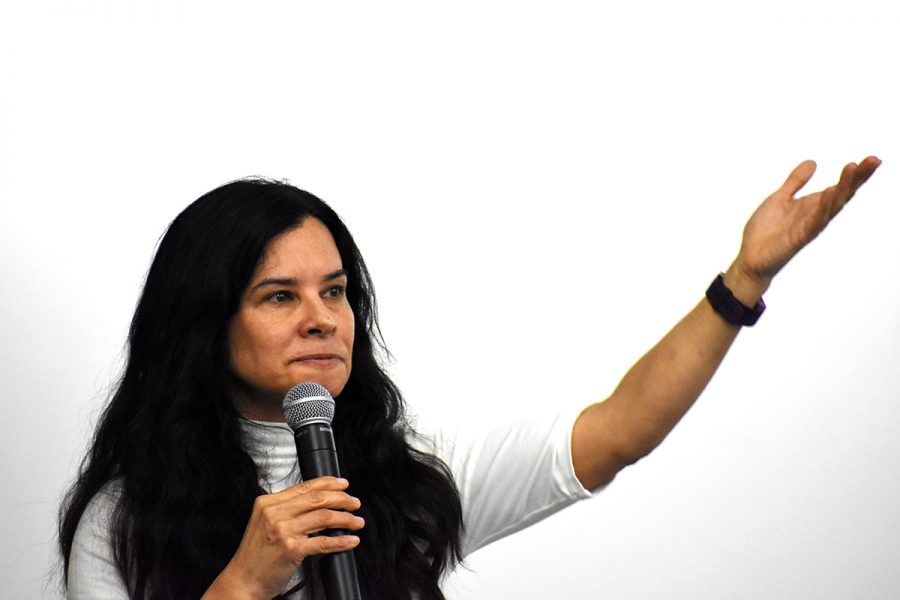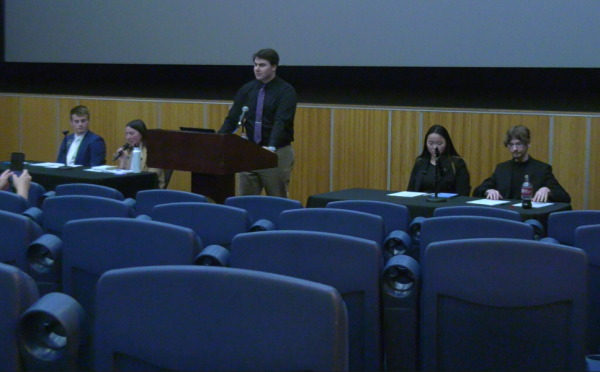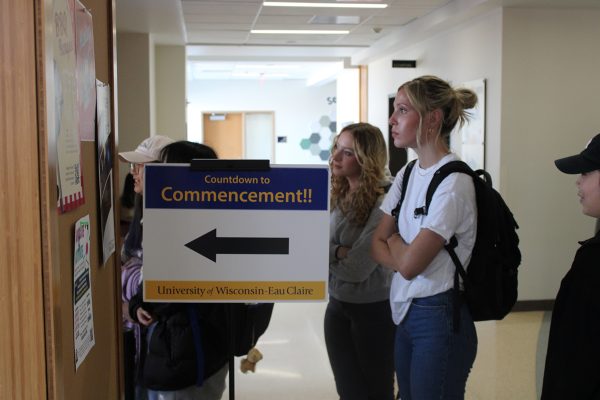Fighting for immigration justice
Christine Neumann-Ortiz discusses role of women in resistance
More stories from Alivia Kistler
Photo by Rachel Helgeson
Christine Neumann-Ortiz presents about Voces de la Frontera, which works to protect and expand immigrants’ rights.
Students and community members gathered Wednesday night in Centennial Hall to hear a Women’s History Month presentation about the leadership roles of women in the fight for immigration justice.
Melissa Moore, from the Office of Multicultural Affairs, introduced Christine Neumann-Ortiz, an advocate for Immigrant Justice and founder of Voces de la Frontera, an organization committed to expanding civil rights through leadership.
Ortiz is a daughter of immigrants, and a first generation American. Her mother is from Mexico, and her father is from Germany.
“Ethnic heritage has shaped who I am,” Ortiz said. “My mother expresses having pride in your heritage.”
She told the audience about her comfort with her self-worth. In addition to this she also mentioned her realization of the prevailing fact that there was nothing she could do about her oppressed position in society due to being an immigrant. When she came back to Wisconsin after years of travel, she said her first exposure to student activism was in college. Ortiz discovered pitting groups against each other is what the government does, and the unity across different identities is what prevents the separation of groups; this unity is what she works toward.
Voces de la Frontera is an organization that works with immigrants and refugees of all backgrounds, Ortiz said. She told the audience the main goals of Voces include: training people to know what their rights are, forming rapid response teams, knowing what is going on in their communities and emphasising the role of citizens to stand with immigrants.
Ortiz talked about Voces’ work throughout the Obama administration to stop the high rates of deportation, as deportation had never been as high as it was during his time in office.
Her presentation began with a video created by Neuman-Ortiz’ organization. Neuman-Ortiz said this video showed:
“Resistance strategies used by Voces called ‘Day without Lantinx Immigrants’, which is a statewide general strike that highlights the important economic impacts of immigrants.”
Ortiz said throughout the presidential campaign of 2016, Voces de la Frontera built a resistance to set into motion only if Donald Trump won the election. After Trump won the presidency, the organization put to work its plan of a general strike to protest the election results and had not only working age Latinx, but also school age Latinx to participate in the strike. Over 50,000 people marched in Milwaukee, Wis. to protest the election results Ortiz said.
A nationwide ‘Day without Immigrants’ on February 16, 2017 was organized in response to the Milwaukee march.
Ortiz presented the statistic that 1 in 10 jobs come from the dairy industry in Wisconsin and continued on to state 80 percent of that workforce is made of immigrant workers, who are often undocumented. Ortiz said that the goal of the strike was to show people the impact of immigrants.
“You’ll see what it’s like when I’m not here,” Ortiz said. “Together we are going to send a message.
“Deportations have been going up 41% already,” Ortiz continued. “This impacts women as the main targets are the men. The father is often the breadwinner with a mom who is left behind and is now pushed into a disadvantage to pay the bills and no power to fight the deportation.”
Through Voces de la Frontera, Ortiz said that many parents began to speak out for who they actually are and not who they are presented as in society.
“I know that first of all the movement is very strong because it is family based.” Ortiz said. “Always strong representation, where parents find their courage is when they know they could be taken away from their kids. Only because of the immigrant movement was there pushback.”
Ortiz told a story of a specific group of people who Voces de la Frontera helped. She said her organization met with 25 workers in the Whitewater area, where most workers were women and single moms. They left their jobs — even under the treat of being fired — and walked out. Then, the workers reached out to Voces de la Frontera, Ortiz said.
Ortiz said that these women demonstrated the level of sacrifice that has to be made as a single mom. Voces de la Frontera has been able to successfully reinstate people by assigning delegates and applying community pressure to get the jobs back, Ortiz said.
“I know its something beyond our lifetime but we need urgency and passion,” Ortiz said “especially nowadays as we are at an historical moment, very opportune time for us to be alive right now. Recognize that you need to pace yourself while also thinking about what’s next.”
“There’s so much to take away from this.” Ashlea Orth, a fifth-year Women’s Studies student said. “Starting conversations and hearing conversations like this and bringing them to your community is how we get stuff done. She gave us the tools and examples to produce results on our own.”











